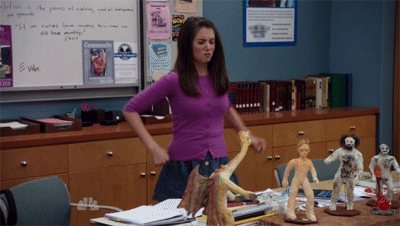When I read Oklahoma News in general:
When they report scientific findings:
Consider this my official rant on why I hate being in public and having conversations with people regarding science and social concerns. First, it's not your fault. Secondly, something has to change. The actual science communication being taken place outside tornadic weather and meteorology is at best ignorant.
When Earthquakes became a concern and how it relates to our booming oil industry, I saw a glimmer of hope in regards to science communication here. I even thought StateImpactNPR was going to change Oklahoma UNTIL I read this recently. It was under their topic page.
Exploring The Link Between Earthquakes and Oil and Gas Disposal Wells on StateImpact.NPR.Org
 |
| bc people love and thoroughly understand graphs. |
 |
| IDK WTF this video had to do with anything. |
 |
| Just enough to make their point but what about past wells? |
Although I appreciate the author's efforts to provide us Okies with details on this important topic of discussion lately, it is clear to me, they still have a lot to learn on communicating science research correctly. I suggest they start with Nature's piece Policy: 20 Tips on interpreting scientific claims.
Also, a little professional courtesy addressing scientist's work and how not to title it:
Posing a question and using "these" to describe a knowledge source in your article has a negative connotation attached, as if they aren't really relevant to your discussion but you are performing a personal reach-around to appeal to your argument. Show a little respect if your objective depends on THEIR WORK.
If the objective was to offend the scientific field experts in this subject, this next line surely nailed it.
"None of these reports have claimed to have absolute proof that the two are linked. In other words, there is no scientific certainty surrounding the phenomenon."
I found myself having an immediate personal breakdown after reading this statement. I am sharing this moment of personal anger because it is relevant. Compare sentence structures with that of the scientist. We make compelling arguments, the latter being an obvious emotional response but why is it important? One appears to be logical and rational, the other not, making certain it be ignored. Their subtle convincing delivery of factoids is what makes THE compelling argument. Scientists are tired of playing this game. We have a science of science communication movement to address this. However, Oklahoma News Media, currently holds no expert in both to address the public. Soon enough I was speaking thoughts outloud that can be best transcribed as:
Their specific arrangement of words are detrimental to the public's interpretation of scientific reports. It means nothing, all it does is increase this dichotomy between what is known and what is understood. A reporter's job is to be an accurate information filter between scientists and society. It is NOT their job to assess data and draw conclusions, or even take a position that impacts social consequence. The former is for scientists and the latter is the job of citizens and politicians (thus forming policy). The media's job is to work with the responsible party of the scientific community to present the scientific facts supported by their institutions.
What scientific reports the author did cite, promoted this false-hood about what was available, and then had the balls to use technical terms to form a scientific fact-based statement supporting an opinion or a position. They had no authority.
Here is what your public servant mouth-pieces forgot to share with my fellow Okies who want information surrounding this discussion:
1. First and foremost, it is important to understand Oklahoma's Oil and Natural Gas Environmental Regulations.
Anything that poses a public concern in relation to the oil and gas industry is taken up by the Oklahoma Corporation Commission and implemented by Oil and Natural Gas Division. You can read their most recent final 2011 State Review here which tackles these topics specifically:- Risks Associated with Hydraulic Fracturing
- Standards to Prevent Contamination
- Hydraulic Fracturing Standards
- casing/cement
- conduits for fluid migration
- mechanical/operational changes
- surface controls
- contingency planning
- waste characterization, management and tracking
- reporting requirements
- disclosure of information regarding chemical constituents
- Public Information
"Information is made widely available through the newly redesigned OCC website (occeweb.com). On the website, visitors have access to information on current events of public interest, OCC rules and forms, oil and gas databases, and many other sources of information in a quick and easy manner. In addition to the updates made on the website, the OCC has been converting its older databases to a new Risk Based Data Management System (RBDMS), which will improve our abilities to track oil and gas operations and our own office and field activities, respond to incidents, and publish information in a safe and reliable way."
2. The importance of this report and how it currently relates to earthquakes and well activity.
- The Oklahoma Corporation Commission that would be responsible for addressing environmental concerns is called the Oil and Gas Conservation Division, OGCD. This report was a review of their guidelines by STRONGER, the State Regulation of Oil and Natural Gas Environmental Regulations. What is impressive, is the cooperation and transparency of the OCC and their efforts to contribute to a comprehensive program to improve their rules and regulations.
- It used the term "seismic" once through-out the final report, indicating seismic activity was not considered an environmental concern when implementing past regulations. Thus, any practices or procedures being tested with these theories have not been part of the reports.
- It wasn't until 2011, that OGCD were advised to change their well completion reports to now include "aggregate volumes of fracturing fluids and proppant used, the fracture pressures recorded, pressure behind the casing and hydraulic fracture materials used."
- No significant data can be accurately accumulated and analyzed until 2016 because "The OGCD has prepared and is implementing a 5-year strategic plan that contains specific goals and includes hydraulic fracturing in the goals. The review team views the plan as a positive program management tool and commends the OGCD for this action. "
3. Policy decides how science will be used. Reporters and journalists know this all to well considering the most recent piece Top 20 Things Scientists Should Know About Policy. So while the author claims no scientific certainty here, it is due to the availability of evidence or actual data specifically related to Oklahoma wells. We have only just begun this exploration adventure.
Good news is that there are plans in place to guide those who want to further research the scientific mysteries of earth, oil and man. Oklahoma Geological Survey has made its first designation towards the cause... and I almost fell off my chair when I saw a picture of the person responsible. I was shocked because I know that guy. Not as in I "know KNOW" him but I recognize him. He worked in the same building I did at my last job. I mostly only saw him during the late late hours or weekend, outside having the occasional smoke and looking as annoyed and sleep-deprived as I was back in those days. He never had a bad demeanor when acknowledging my constant presence, but I saw him enough to provide this mystery. It's important to know that people representing important institutions work at a pace unlike journalists. The two occupations couldn't be more different in that aspect. All I know is I hope that guy is getting the funds he needs to adhere to an agreeable timeline in search for these answers. Also, when starting scientific research in an area like Oklahoma regarding seismic activity, there was no reason to contain staff and training for a demand like this. Everything is a process and scientists are human too.
4. In regards to scientific speculation and content on what has been done outside Oklahoma on earthquakes, oil and gas operations and scientific findings, I recommend these articles:
Scientific American: Oil Addiction Not Fracking Caused The 2011 Oklahoma EarthquakesNational Geographic's Earthquake Study Points To Possible Carbon Injection Risks
Scientific American's Drilling And Pumping Wells Spawn Powerful Earthquakes
5. Committing a crime by conclusion.
 Misquoting a scientist or expert is a sure way to NEVER EVER establish credibility to pull the resources you need. They also spelled their name wrong. Wow.
Misquoting a scientist or expert is a sure way to NEVER EVER establish credibility to pull the resources you need. They also spelled their name wrong. Wow.In an attempt to wrap up as what I can best speculate as an attempted drunk diary entry- the un-named author forgot to cross-check who Dr. Cliff Frohlich was and what kind of official statements he has published in response to THIS SPECIFIC TOPIC. Please read below.
Texas State Impact by Dr. Cliff Frohlich: How Oil and Gas Disposal Wells Can Cause Earthquakes
On the SAME WEBSITE under State Impact Texas, there are important points made by Dr. Frohlich regarding that state, same topic.
"I'm not an expert on climate engineering, but a number of solutions have been proposed," Frohlich said. "Whether they are good ideas or not, the jury is still out. Anytime you mess with the environment, there are unintended consequences."
6. Me vs Them.
Although the author goes unnamed, I will tell you that I was able to curate reliable sources and form a coherent string of topics actually relating to this discussion, with important points of concern from both parties. I am no phd or journalist but I have performed rigorous important scientific research and ran a business involving policy and regulations. I also was born here and would like see this state producing well-rounded scicomm people. Is that too much to hope for?







No comments:
Post a Comment